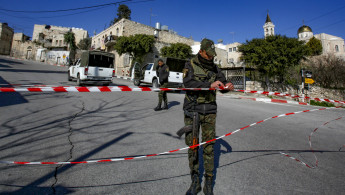Israel to build an 'apartheid road' for Palestinians in the West Bank
The settlement plan, which was revived by Israeli Prime Minister Benjamin Netanyahu ahead of the 2 March general elections, will enable the construction of 3,500 new settler homes in a controversial area of the occupied West Bank.
The plan, known as East 1 or E-1, will cut off the northern part of the West Bank from the southern party and pose as a major obstacle to the creation of a Palestinian state.
"We are giving a green light to the 'Sovereignty Road' today," Bennet said.
The new road will connect the Palestinian neighbourhoods of Anata, Ezzaim, Hizma and Ar-Ram, north of the Israeli settlement Maale Adumim.
"It allows Palestinian vehicles to move without crossing inside the Maale Adumim bloc, near Jewish communities," he said.
"The project will improve the quality of life of the residents of the area, prevent unnecessary friction with the Palestinian population, and most importantly - enable the continuation of building in the settlements. Imposing sovereignty in deeds, not in words. We will continue that way."
The international community has warned repeatedly that Israeli settlement construction in the E1 corridor - which passes from Jerusalem to Jericho - would slice the West Bank in two and compromise the contiguity of a future Palestinian state.
Twitter Post
|
Last month, a spokesman for Palestinian President Mahmoud Abbas said the plan "violates international law and breaches all red lines".
In 2013, Netanyahu vetoed construction in the E1 corridor in the face of pressure from the UN, EU and US.
The move to advance new homes, which would constitute a new neighbourhood of Maale Adumim - a nearby settlement town - were praised by settler lobby group Yesha Council, which noted that plans for homes in the area have existed since 2004.
Israel seized the West Bank and east Jerusalem in the 1967 war in moves never recognised by the international community.
Israeli settlements in the occupied Palestinian territories are considered illegal by the United Nations and most foreign governments.
Follow us on Facebook, Twitter and Instagram to stay connected





 Follow the Middle East's top stories in English at The New Arab on Google News
Follow the Middle East's top stories in English at The New Arab on Google News
![Netanyahu furiously denounced the ICC [Getty]](/sites/default/files/styles/image_330x185/public/2024-11/GettyImages-2169352575.jpg?h=199d8c1f&itok=-vRiruf5)
![Both Hamas and the Palestinian Authority welcomed the ICC arrest warrants [Getty]](/sites/default/files/styles/image_330x185/public/2024-11/GettyImages-2178351173.jpg?h=199d8c1f&itok=TV858iVg)
